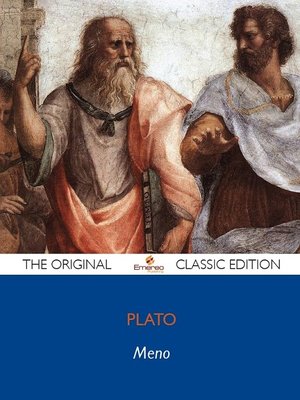Meno - The Original Classic Edition
ebook

Sign up to save your library
With an OverDrive account, you can save your favorite libraries for at-a-glance information about availability. Find out more about OverDrive accounts.
Find this title in Libby, the library reading app by OverDrive.



Search for a digital library with this title
Title found at these libraries:
| Library Name | Distance |
|---|---|
| Loading... |
To my mind the Meno is among the most mysterious of Plato's dialogues. Beginning with a discussion as to whether virtue can be taught, the interlocutors move into an inquiry into the nature of knowledge itself. Here we get a famous scene in which Plato demonstrates his theory of knowledge as recollection through an illustration in geometry. This is principally a work of epistemology, but it remains a strangely oblique portrait of eidetic truth.
Meno is a Socratic dialogue written by Plato. It attempts to determine the definition of virtue, or arete, meaning virtue in general, rather than particular virtues, such as justice or temperance. The first part of the work is written in the Socratic dialectical style and Meno is reduced to confusion or aporia. In response to Meno's paradox (a.k.a. the learner's paradox), however, Socrates introduces positive ideas: the immortality of the soul, the theory of knowledge as recollection (anamnesis), which Socrates demonstrates by posing a mathematical puzzle to one of Meno's slaves, the method of hypothesis, and, in the final lines, the distinction between knowledge and true belief.







